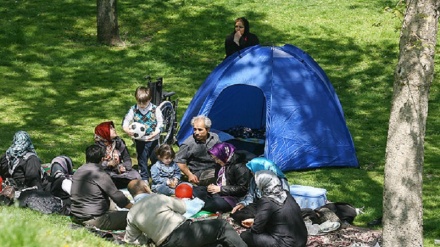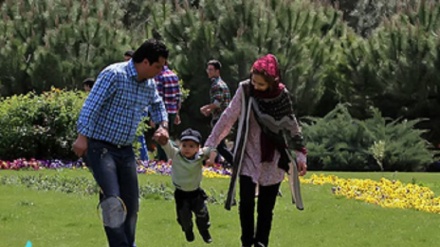Iranian Family (7)
Welcome to this week's episode of the series Iranian Family. Marriage is a divine and religious phenomenon which leads to mankind's development and peace of mind. One of the most important factors in marriage is the age of the individual.
The question that many people ask is what is the appropriate age for marriage? Undoubtedly, in additional to physical growth; psychological and social growth and development are essential for one to be prepared for marriage. At the later period of adolescence, one usually reached puberty and gains the capacity for reproduction. In the later days of adolescence, the majority of girls think about marriage. However, boys within the same age group, do not seek marriage. Marriage is the only legitimate and healthy means for meeting the physical and psychological needs of teenagers. However, for a marriage to be successful, the individual should also be biologically, mentally, and socially prepared. Hence, experts believe that the appropriate age of marriage for girls is within the age group of 18-24 years, and for boys within the age group of 24-28 years.
Sociologist, Dr. Bahram Navabifar, notes that the lesser the age difference between the spouses, the lesser problems they will face in their marriage. According to the principles of sociology and psychology, the appropriate age difference between spouses for a successful marriage is five to seven years. The marriages which are based on temporary emotions, are the ones in which the woman is more than five years older than his husband, and in the majority of these marriages, the spouses are after goals such as wealth and beauty; and think of marriage as a highly profitable contract.
This sociologist adds: In the marriages within which there is major age gap between the spouses, they may become disappointed with each other. For instance, when a 35-year-old woman marries a 25-year-old man, in the following years, when the woman is middle-aged, her husband is at the peak of his youth. At this point in time, the consequences of this type of marriages which are based on temporary emotions, surface, leading to disappointment, separation and even divorce of the married couple. In accordance to religious sources, it is better for individuals to marry at a young age, and the age difference between the spouses should also be appropriate for a successful marriage.
At this point, we become familiar with another feature of Iranian families. One of the advantages of Iranian families is the sense of responsibility of parents toward their children. The relentless support of parents for their children, and the sense of responsibility among parents for the provision of welfare and health of their children are some of the main pillars and foundations behind formation of families in Iran. Based on the outlook of Iranian families, child is a divine blessing which has been bestowed on parents.
The main responsibility of parents toward their children is an appropriate upbringing of the children.
According to the Prophet of Islam, Mohammad (Blessings of God upon him and his progeny), parents who provide an appropriate upbringing for their children, leave the best possible legacy for their children.
Throughout the process of modernity, and concurrent with the reconstruction of social infrastructures, parental support for their children has gone through ups and downs. The relationship between many parents and children, which was previously based on the values and norms governing the community, and accepted social criteria, have been replaced with a new relationship between parents and children. In the past, separation of roles between the man and woman delegated mothers, full responsibility for taking care of children; while making fathers fully responsible for provision of economic support for the family. Currently, the governmental supportive systems have contributed to a decline in the family's unity, while failing to dispel all concerns and to act as a reassuring replacement. The cultural developments in the recent decades have also contributed to a decline in family's unity, and indifference toward collective values. The extended family, which in the past, provided an assistive role for married couples, especially within the early years of the couple's married life, currently maintains a lesser role in the life of married couples.
Nonetheless, based on statistical figures and opinion polls in Iran, parents still make utmost efforts for appropriate upbringing of their children, and there is a meaningful difference between the Iranian community and other countries and cultures in provision of parental support for children. In the Iranian community, parents still feel a strong sense of responsibility toward their children.
Married life faces many ups and downs; one of which is the tensions which may emerge between spouses. Meanwhile, emergence of these tensions is natural, while the important point is how to deal with these tensions so that no blow would be dealt against amicable relationship between married couples. The apology of spouses from each other is a behavior which nurtures love and kindness within married couples.
Naturally if one of the spouses makes a mistake, disheartening and disappointing the other spouse, the whole foundation of family becomes vulnerable, and if the related spouse would not apologize for their mistake; this blunder would leave a lasting impact on the psyche of the other spouse. Hence, psychologists always call on the spouse, who has wronged his/her significant other to apologize as a means to dispel the existing tensions sensed by the married couple.
MR/ME


